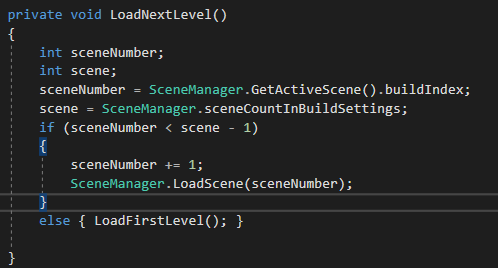If you’re reading this, there probably aren’t very many posts yet. But don’t worry, you can be the first! Either create a new post or just reply to this one to say ‘hi’.
I figured out how to loop through the levels with the modulus operator, in case anyone else wants to know:
void LoadNextLevel()
{
int currentSceneIndex = SceneManager.GetActiveScene().buildIndex;
currentSceneIndex = (currentSceneIndex+1) % SceneManager.sceneCountInBuildSettings;
SceneManager.LoadScene(currentSceneIndex);
}
2 Likes
heres my version of events for the scene looping
added a couple of console outputs to inform user.
void ProcessDebugInputs()
{
// if L key pressed load next level immediately
if (Input.GetKeyDown(KeyCode.L))
{
int totalLevels = SceneManager.sceneCountInBuildSettings; // gives total level count ( eg scenes 0,1,2 gives us 3)
int currentlevel = SceneManager.GetActiveScene().buildIndex; // this is the 0 based index of the current scene
// if its the last scene just reload, otherwise load next
if(currentlevel == totalLevels-1)
{
SceneManager.LoadScene(currentlevel);
Debug.Log("Last scene in build so reloading same level");
}
else
{
SceneManager.LoadScene(currentlevel+1);
Debug.Log("Another Scene vailable, Loading next level");
}
}
// disable collision detection
if (Input.GetKeyDown(KeyCode.C))
{
collisionsEnabledFlag = !collisionsEnabledFlag;
Debug.Log("Collision detection enabled = " + collisionsEnabledFlag);
}
}When dealing with how the game loads the first level after beating your last. Are there any pros/cons to replacing “nextSceneIndex = 0; // loop back to start” with “LoadFirstLevel();” (What we used to reload on death).

1 Like
Here was my code from the challenge:
int currentSceneIndex = SceneManager.GetActiveScene().buildIndex;
int nextSceneIndex = ((currentSceneIndex + 1) == SceneManager.sceneCountInBuildSettings)? 0 : currentSceneIndex + 1;
SceneManager.LoadScene(nextSceneIndex);Yet another version.
private void LoadNextLevel()
{
state = State.Transcending;
audioSource.Stop();
audioSource.PlayOneShot(nextlevelClip);
nextlevelParticles.Play();
Invoke("LoadNextScene", loadLevelDelay);
}
private void LoadSamelevel()
{
SceneManager.LoadScene(SceneManager.GetActiveScene().buildIndex);
}
private void LoadNextScene()
{
// check if there is another scene in build settings after this one
if (SceneManager.GetActiveScene().buildIndex + 1 < SceneManager.sceneCountInBuildSettings)
SceneManager.LoadScene(SceneManager.GetActiveScene().buildIndex + 1);
else
{
SceneManager.LoadScene(0);
}
}
